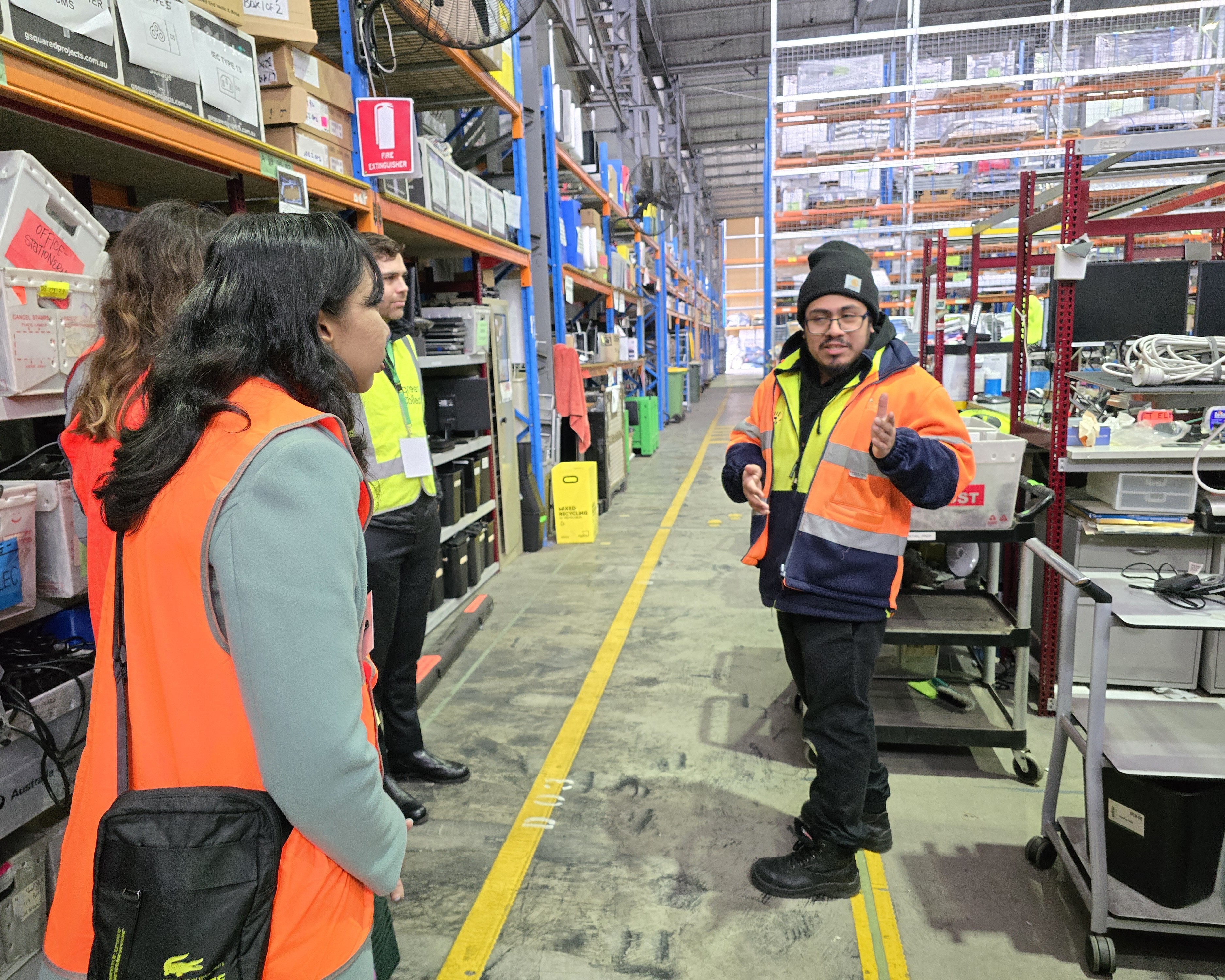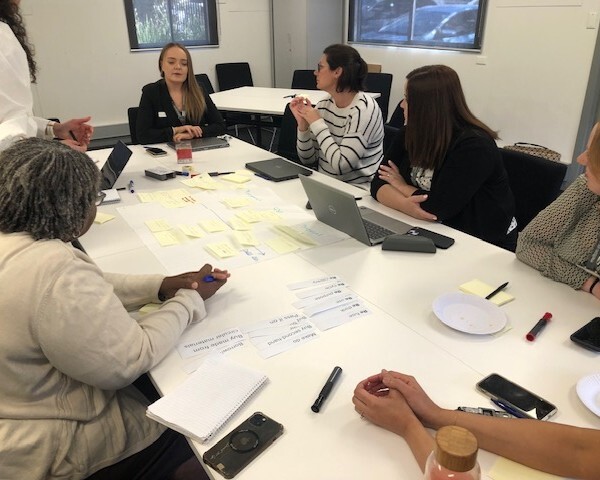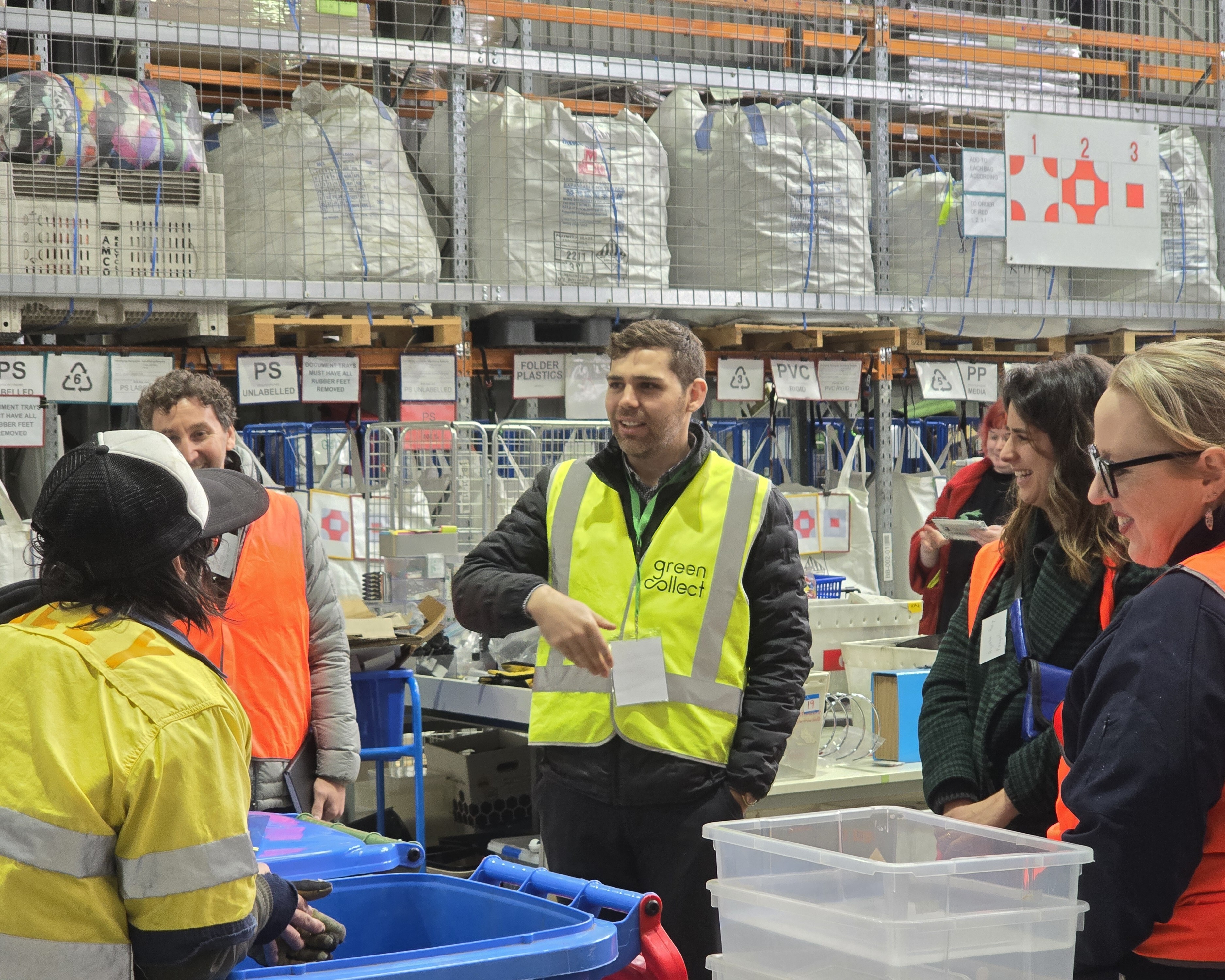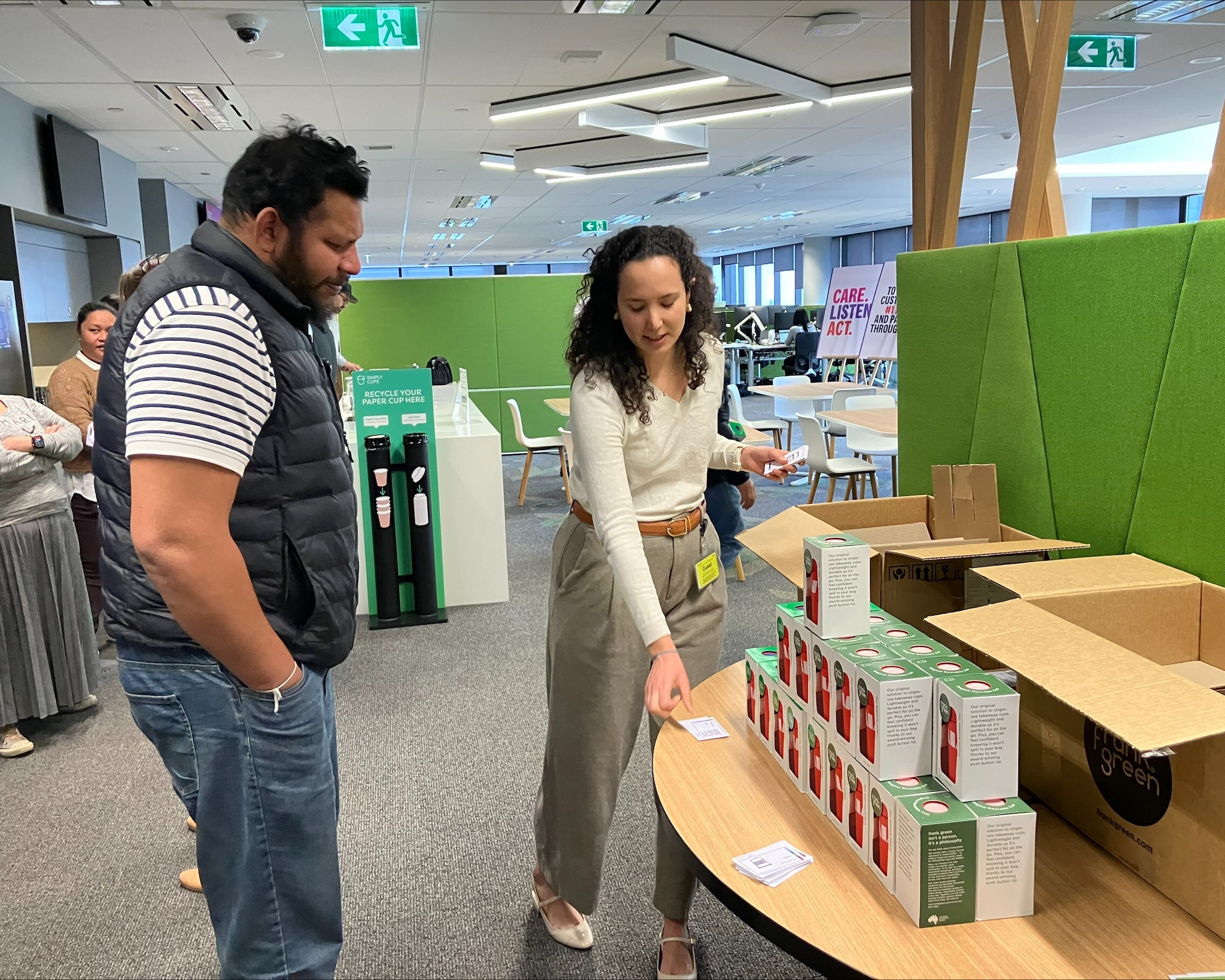Funded project – Green Collect
The Circular Capabilities Package connects Green Collect's circular economy training with its business service, offering organisations a comprehensive action-oriented solution to support workspace behaviour change and business process innovation for greater circularity.
Background
Office-based organisations often generate substantial waste despite their seemingly low environmental footprint. From furniture and fit-outs being replaced during relocations to IT equipment upgrades and discarded stationery when employees leave, the volume of materials entering the waste stream is considerable. With affordable purchasing options readily available, many organisations lack the knowledge, skills, and resources to procure sustainable products initially or to responsibly manage items at their end of use.
Green Collect, with 20 years of experience collecting unwanted products from Victorian offices, has observed increasing volumes of discarded materials. Many items collected are practically new or barely used, often disposed of in ways that damage them and reduce opportunities for second lives. This represents a significant missed opportunity for implementing circular economy principles.
To address this gap, Green Collect developed the Circular Capabilities Package (CCP), a comprehensive action-oriented solution connecting their circular economy training with their business service. The CCP supports workspace behaviour change and business process innovation to help organisations transition toward greater circularity.
While Green Collect offers an office clean-out and de-fit service as an alternative to landfill disposal, always aiming for the highest value outcome with a focus on reuse, this approach faces challenges due to both the volume of materials and procurement habits that lead organisations to regularly replace functional items or purchase lower-quality products. The CCP goes beyond these "end-of-life" solutions to provide organisations with the knowledge and tools to make more impactful decisions throughout the product lifecycle.
Through the Circular Capabilities Package, Green Collect helps organisations become more circular in three key areas:
- Procurement: Introducing circular economy principles into procurement and inventory management practices
- Product Life Extension: Increasing the usable life of furniture, IT equipment, stationery, and office sundries
- Maximising End-of-Life Value: Sorting and disposing of items in ways that maximise value and impact at end-of-life, while accessing collection or recycling services that avoid landfill waste.
Stages
| 17/05/2024 | Staff recruitment and induction |
| 30/06/2024 | Product development phase |
| 28/06/2024 | Programme promotion and participant organisation recruitment and onboarding |
| 30/07/2024 | CCP Programme Phase 1: Circular Transition Assessment |
| 30/08/2024 | CCP Programme Phase 2: Implementation |
| 15/12/2024 | CCP website development and Green Collect brand refresh |
| 30/09/2024 | CCP Programme Phase 3: Behaviour Integration and completion |
| 30/11/2024 | Programme evaluation and finalisation |
Outcomes – what worked?
The Circular Capabilities Package pilot successfully connected Green Collect's circular economy training with its services, offering a comprehensive solution to support workplace transitions towards circularity. This pilot engaged 12 diverse organisations, including local councils, tertiary institutions, a coworking space, a design studio, an environmental consultancy, and a nationwide bank.
Key outcomes:
Improved awareness and understanding
The project reached 298 people, with 53 actively engaging through lifecycle mapping workshops or the Fundamentals of Circular Economy training module. Additional engagement included approximately 200 Westpac employees participating in a waste sorting game, with 87% reporting increased confidence in correct waste disposal, and 50 Brimbank Council employees joining a coffee cup reduction competition.
Increased partnerships and collaborations
Twelve organisations participated in the pilot program, connecting not only with Green Collect but also with each other through four online sessions. Two participating TAFEs—Melbourne Polytechnic and Wodonga—who met through the pilot are now collaborating on further development of the new Certificate in Circular Economy Practices. All participating organisations reported feeling inspired to investigate and implement circular economy solutions for their organisations.
Generation of innovative circular business models and products
Every organisation developed at least one new idea for a business process or policy to support circularity. Seven organisations received tools to improve their procurement practices, including templates for circular procurement policies, supplier vetting checklists, and asset tracking tools. Two organisations implemented gamified activities to encourage behaviour change, while three created guides to share circular practices with their clients.
Most notably, Green Collect developed a new commercial product—the Circular Capabilities Package—now being prepared for market launch as a fee-paying service.
Challenges
Variable engagement of organisations over time
Time commitment proved to be the biggest challenge. While Green Collect had hoped organisations would progress at a similar pace over 3-4 months, most experienced delays due to internal factors. This shifted the planned cohort experience to a primarily individual approach. Not all organisations completed the program: one couldn't engage at all, and two reached their final activities too late for inclusion in the evaluation.
To address this, Green Collect maintained flexibility and regular contact with participants, providing templates for workshops and education sessions, and copies of the Circular Practices Kit to help organisations conduct assessments and activities at their own pace.
Over-reliance on individual commitment
A common theme in sustainability initiatives emerged: without organisation-wide strategy and commitment, even the most motivated staff members struggled to dedicate the necessary time and attention to create meaningful change. A clear difference was observed between organisations where the contact had sustainability as their designated role with executive support, versus those where involvement stemmed from personal interest or was assigned to an already-busy employee with little connection to sustainability.
Green Collect's approach focused on supporting, coaching, and mentoring these individuals while learning about both barriers and organisational strategies that could provide entry points. They concentrated on equipping participants with knowledge and tools to present practical, achievable solutions to their teams.
Measuring impact in a short timeframe
The ambitious timeframe of the project made it difficult to observe measurable behaviour change results in all participants. Many indicated that meaningful change would require more time to embed, especially for those focusing on policy modifications or behaviour mapping before implementing interventions. For future iterations, Green Collect plans to include follow-up sessions several months later to properly assess long-term impact.
Insights to share with other businesses
Organisations are at different stages in their sustainability journeys, requiring tailored approaches to meet them where they are. Within organisations, individuals working to introduce circular, sustainable actions into operations often feel isolated and overburdened. Finding and supporting these champions enables them to have greater impact.
Collaboration remains key to success. The relationships developed during this pilot, and the potential for future collaboration between participants, hold promise beyond the project itself. Building networks of like-minded organisations and individuals creates opportunities for shared learning and amplified impact.
What's next?
The learnings from this project have enabled Green Collect to test and refine the Circular Capabilities Package as a commercial product. The diversity of pilot organisations—in business models, existing knowledge, and available resources—demonstrated that the product needs to include various entry points, self-access tools, and consulting services tailored to where organisations are in their circular economy journey.
In the first half of 2025, Green Collect will re-launch their website and brand identity, along with the CCP, to a commercial audience. They plan to reach out to existing clients to offer the new product as an add-on to current services and run a social media campaign sharing CCP learnings to promote their services.
This experience has also supported Green Collect's successful application to host a Deep Learning Community for the Commonwealth Government's Social Enterprise Development Initiative (SEDI). This community will unite social enterprises working in the circular economy across Australia, as well as those wanting to adopt more circular practices. Green Collect will immediately apply aspects of the CCP to enhance the skills and capacity of this community.
From the grantee
"At Green Collect, we deeply understand the value of keeping resources in circulation and have been committed to helping organisations do this for a long time. This CEBIC funding has given us an opportunity to dive deeper into the expertise we have developed over many years, and build relationships with organisations who we can share it with. We have really enjoyed the opportunity to work more closely with organisations to understand their challenges and goals, recognise the work they're already doing, and explore their opportunities to make an even bigger difference. It has been so affirming to work alongside our pilot participants and see them practicing different approaches, and learning about circular economy by doing."



